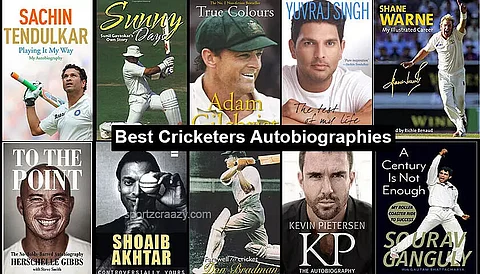
- Home
- Live Blog
- Breaking News
- Top Headlines
- Cities
- NE News
- Sentinel Media
- Sports
- Education
- Jobs

A few acclaimed autobiographies by Indian cricketers
GAUTAM GANGULY
In the midst of on-going, electrifying IPL 2020 matches with loyal army of Indian cricket lovers getting euphoric, rallying solidly behind at some of superb performances, once again reaffirms their undiminished, eternal passion for cricket, the real religion, that binds teeming millions of Indians. Interestingly, even a cursory look at the treasure of English literature familiarises a casual reader with host of brilliant writings by some of the distinguished writers who have got their names curved out alongside immortal litterateurs of the world. The crowning example of such a celebrated writer is Sir Neville Cardus who was knighted for his outstanding writings on cricket and music. Till late 70s, one of the prose pieces of Cardus used to be included in the syllabus of English Honours course.
The high quality of writings of the likes of R. K. Narayan, Mulk Raj Anand and a galaxy of writers have resulted in enriching the Indian English literature and its quality has gone up manifold , a fact, acknowledged unanimously by the highly respected English literary critics across the world. As a corollary to such healthy development in literary scenario, the writings on Cricket both by players themselves and writers of the stature of Dicky Rutnagar, Dom Mores,Raju Bharatan Dr Ramchandra Guha, Partab Ramchand etc have contributed in the flourishing of Indian Cricket literature as well.
"Style is the man", the saying goes. Mansur Ali Khan Pataudi's autobiographical book titled, 'Tiger's Tale', written in a gripping but cryptic style, holds the mirror before the cricket situation prevalent during the period in its entirety coupled with description of some of the gruelling Indian encounters against some of the formidable opposition like England and Australia. His writing brings to fore the hallmarks of his towering personality. True to his nature, Pataudi did not mention much of his own exploits in batting but praised highly some of his other test match colleagues. As a bright student of Oxford, Tiger's Tale, written in the late 60s, contains Pataudi's passing observation on contemporary socio-economic condition as well in the context of cricket, making the book interesting to read.
Ajit Wadekar had shot into prominence in 1971 when the Indian team under his captainship went on to beat West Indies and England for the first time in their home grounds and won the rubber thereby making the Indian cricket fans ecstatic and euphoric. Cricket, overnight, became a game of the masses coming out of the clutches of rich and upper middle class. Ajit wadekar took advantage of his enormous celebrity status and brought out his autobiography titled, 'My Cricketing years.' The book, coming in the wake of his successive victories, was an instant success and attracted many readers otherwise uninitiated in cricket. However, the book is also supplemented with the acknowledgement, "as told to Mr. K.N. Prabhu."
The sophisticated, articulate maestro, Sunil Gavaskar, with his St. Xavier's, Mumbai, background, has written a number of books, the most noteworthy being his immensely popular autobiography," Sunny Days". The book has been sold like hot cakes. Gavaskar's enviable command over the language, his magnificent presentation of various happenings--- both on and off the field --- captivates a reader instantaneously and is an 'un-put down able book'. Widely acclaimed by the critics, the book, had created controversy as well . Especially, Gavaskar has been unkind to West Indies supporters whom he called "uncivilised and fit to remain in Jungles". !! Needless to say, such unpalatable comments were strongly condemned not only by the West Indians but in India as well. Gavaskar went on to write, thereafter, "One Day Wonders" which gives a detailed account how India became champion in Australia in the World Limited over tournament organised by the Australian Cricket Board in the year 1985 in which all test playing countries had participated.. All of Gavaskar's books make fantastic reading.
Kapil Dev has two books to his credit. His first publication, 'By God's Decree', narrates his rise from a humble background to achieve his dream of playing for India. Interestingly, the maestro saw the first test live when he himself had played his first test at Faisalabaad, Pakistan. His other book titled, 'Cricket, My Style' also expresses his resentment against Sunil Gavaskar for his 'lack of positive attitude and aggression'. Further, Kapil gives vent against 'Little Master' for dropping him in the Kolkata test against England in 1984. Kapil's books reveal his humility and modesty despite his enviable achievements. Critics, however, point out that the books are 'ghost written' !!!
Sachin Tendulkar's autobiography, 'Playing it my way' is devoid of ornamental stylistics. True to the characteristic of the 'Master Blaster', he expressed uninhibitedly his emotions and experiences in a candid manner like the way he played all through his illustrious career bereft of any controversy. Tendulkar has expressed his resentment against some of the highhanded actions of Greg Chappel during his tenure as a coach of Team India.
Notwithstanding the impact of technology, autobiographies by sports celebrities continue to inspire a large spectrum of readers across the world justifying the good old saying, ' pen is mightier than sword'.